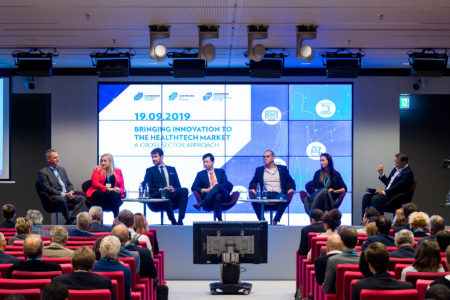 According to the mapping of the health technologies sector in Luxembourg carried out by Luxinnovation in the beginning of the year, around one-fourth of companies have a strong digital focus. This highlights the positive effects of the country’s advanced ICT skills on its fledgling healthtech sector. The examples of companies combining these two specialities are numerous: 3D medical augmented reality specialist Arspectra, LiveMetric, which offers a connected device for managing hypertension, and Hanalytics, which has developed the world’s first CE-certified artificial intelligence application for brain diagnostics, to mention but a few.
According to the mapping of the health technologies sector in Luxembourg carried out by Luxinnovation in the beginning of the year, around one-fourth of companies have a strong digital focus. This highlights the positive effects of the country’s advanced ICT skills on its fledgling healthtech sector. The examples of companies combining these two specialities are numerous: 3D medical augmented reality specialist Arspectra, LiveMetric, which offers a connected device for managing hypertension, and Hanalytics, which has developed the world’s first CE-certified artificial intelligence application for brain diagnostics, to mention but a few.
The heads of these companies were among the speakers at the conference “Bringing innovation to the healthtech market” that Luxinnovation organised on 19 September. The aim of the event was to explore how information technologies, innovative materials and specialised manufacturing processes can be applied to healthcare and adapted to the specific requirements regulating this sector.
Huge market, better lives
Thomas Bentzion, CEO of LiveMetric, has a background in communications, military applications and satellites. He was attracted to health technologies by a strong wish to help people as well as by the huge economic opportunities opening in the field. “Over 1.1 billion people around the world suffer from hypertension,” he said. “Our wrist-worn, non-invasive blood pressure monitor uses very sensitive pressure sensors to monitor the pressure in the arteries and process this data in real time. It has the potential to impact the lives of tens of millions of people who could be monitored in their homes instead of having to be in hospital.”
However, the approval procedure for such a device is both rigorous and time consuming, and not without reason. “The data that we provide has to be on the same level of accuracy as that of an intensive care unit, as it allows doctors to take very significant decisions regarding their patients,” Mr Bentzion pointed out. Nevertheless, it is a challenge for new entrants on the market. “We did not realise how big the hurdles are to get a device certified and clinically approved.”
Cedric Spaas, CEO of Arspectra, was of the same opinion. “Our augmented reality glasses that guide surgeons during operations are difficult to classify according to the rules in place. The certification process has a huge impact on our budget and timeline and is complicated for a young company like us.”
Fulfilling regulatory requirements
Regulatory aspects are indeed perceived as the most challenging aspect for companies interested in the healthcare market. However, the Luxembourg authorities want to provide support. “We are there to help new companies in the field, and Luxembourg is developing a specialised medical agency that will have innovation support as one of its main pillars,” said Anna Chioti, Head of Division Pharmacy & Medicines at the Ministry of Health.
We are building expertise, but this takes time.
As the health technologies sector is still young in Luxembourg, the country does not yet have a notified body designated to assess the conformity of healthcare products before they are placed on the market. “We are building expertise, but this takes time,” Dr Chioti emphasised. “We are discussing a strategy with the Ministry of the Economy and Luxinnovation that would suit the Luxembourg healthtech ecosystem. Meanwhile, we can help companies find other notified bodies to get their products approved. We are also interested in working with firms that can provide us with true use cases to learn more about new technologies such as software and artificial intelligence.”
Medical materials
The conference also looked into the use of advanced materials and manufacturing processes for healthcare applications, with speakers representing industrial companies such as DuPont, Ceratizit and Molecular Plasma Group (MPG). For them as well, the healthcare market is interesting. “The healthcare sector has for long time been relying on a couple of materials such as stainless steel,” said Michael Sogaard, Segment Account Manager Medical at Ceratizit. “Today, there is a growing demand for newer materials that are lighter and stiffer that what is currently used.”
The compliance with health requirements is an important consideration for these companies as well, and the way forward depends on their business models and strategies. “We have chosen to position ourselves as a supplier and leave the regulatory aspects to our customers,” explained Marc Jacobs, CEO of MPG.
Certification can be a protection for you.
The relative complexity of meeting all criteria for certification of healthcare products can also be an opportunity. “Certification can be a protection for you,” said Fedor Antonov, CEO of continuous fibre 3D printing specialist Anisoprint. “Having a solution that is accepted by the regulator often means having less competition, as fewer companies reach this step.”
